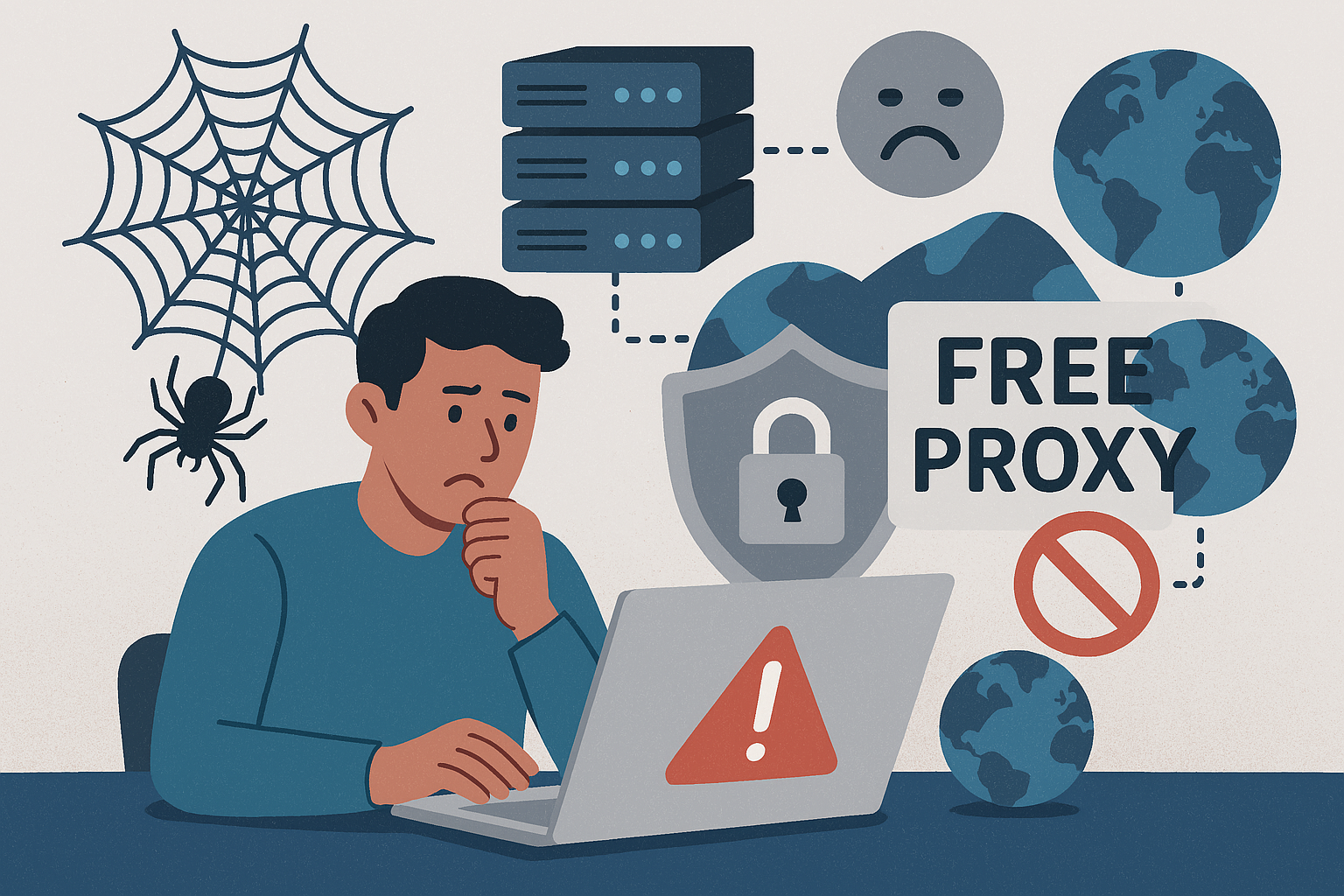Free Proxy Pitfalls in Web Scraping: What Every Data Engineer Should Know
Web scraping is a key technique for gathering data from websites to fuel everything from market research to data analysis. Thanks to proxies, which act as an intermediate between the scraper and the target website, you can avoid hitting any relevant IP blocks or being rate-limited during your data extraction process.
However, many data engineers forget the potential risks or limitations that can affect the success of their web scraping projects, and this article will explore the potential hazards of free proxies in web scraping and how breaking these habits can help you reach the desired data more safely and efficiently.
Free Proxies: What Are They and How Do You Scrape with Them?
Before we get into the cons of using free proxies, let’s take a moment to define proxies in the context of the web scraping process. A proxy server is like a middleman between your computer and the site you want to reach. With a proxy, when scraping, requests go to a website through a different IP address, which can mask the real IP address and prevent detection.
The term “free proxy” refers to any proxy server that can be accessed without any payment, typically supplied by third-party services or individuals. They’re a great choice for people new to web scraping or on a tight budget. When used alongside the best web scraping tools, free proxies can help users efficiently collect data without incurring high costs. However, they have some opposing sides you should be aware of before using them.
Free Proxy Limitations
-
Slow Speed with High Latency
The major drawback of free proxies is that they are usually slow and have high latency. Since these proxies are generally shared among many users, they can quickly be overloaded. This causes a communication delay between sending and receiving data, which may severely affect the scraping speed.
-
Reliability Issues and Downtime
Another problem with free proxies is the non-reliability. Many free proxy servers are not properly maintained and go down frequently. Since you don’t have any control over the proxy server, there is a risk that it could simply come offline at any moment, leaving your web scraping efforts hanging.
-
Security Risks
Free proxy servers are typically not managed or monitored with the same level of scrutiny as those that come at a cost, and there is an increased risk of your data being intercepted or misused. Free proxies can be used to insert malicious software into your device or corrupt your files, which can intercept sensitive data such as login or payment information.
-
IP Reputation and Blocking
With free proxies, you have minimal control over which IP addresses you’re rotating through. Other users can also share the same IPs, causing them to get blocked from target sites. This means you are more likely to suffer from CAPTCHAs, IP blocks, or rate limiting.
Best Practices for Safer and More Efficient Web Scraping with Free Proxies
Although free proxies can be helpful, you should observe the best practices to reduce the risks listed above. Here are the tips to scrape efficiently and safely using free proxies:
1. Use a Rotating Proxy Pool
Consider using a rotating proxy pool instead of relying on a single free proxy. Divided IP addresses ensure that your requests come from multiple IPs, which helps you avoid detection and risk of being blocked. Many free proxy services offer rotating proxy pools, though they might be less reliable than paid options.
When rotating proxies, make sure the interval between two requests is random so that it looks as if a human being is surfing the web when you change proxies. Scraping too quickly raises red flags and gets you blocked or rate-limited.
2. Limit Request Frequency
You should also limit the frequency of your requests to prevent overloading free proxies and reduce the chances of triggering anti-scraping systems on target sites. Ensure you add appropriate delays between requests to avoid flooding the server with numerous requests in a short span.
3. Monitor Proxy Health and Performance
Ensure that the performance and health of your proxies are monitored regularly. While some free proxy services have built-in tools to monitor proxy accessibility, others provide a list of proxies that you will have to test manually before use.
Error-handling mechanisms in your scraping script will also ensure that when one proxy fails, your scraper automatically switches to another instead of interrupting the entire process.
4. Avoid Scraping Sensitive Data
As the security risk is high when using free proxies, do not scrape sensitive or private data with free proxies. If you are working on collecting personal, financial, or confidential information for your project, it is recommended that you use a paid proxy service that provides greater security and reliability.
Conclusion:
Despite the benefits of using free proxies for web scraping, it’s essential to identify their possible risks and take preventative measures. By following best practices like using rotating proxy pools, limiting request frequency, monitoring the health of your proxies, and avoiding scraping sensitive data, you can avoid these pitfalls and still leverage free proxies for your scraping projects.
Free proxies are still a valid way to perform web scraping as long as you are mindful of their shortcomings and take your work and data into account.
Read More: What is Crackstreams Proxy?




